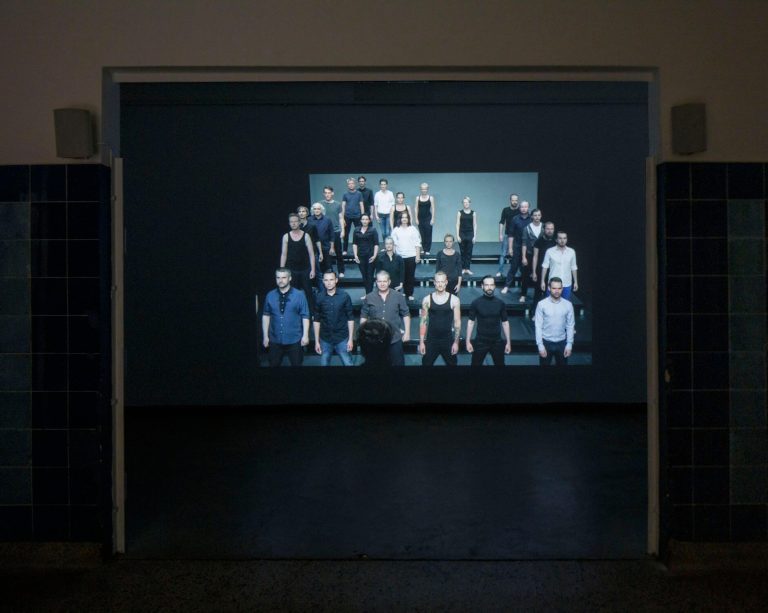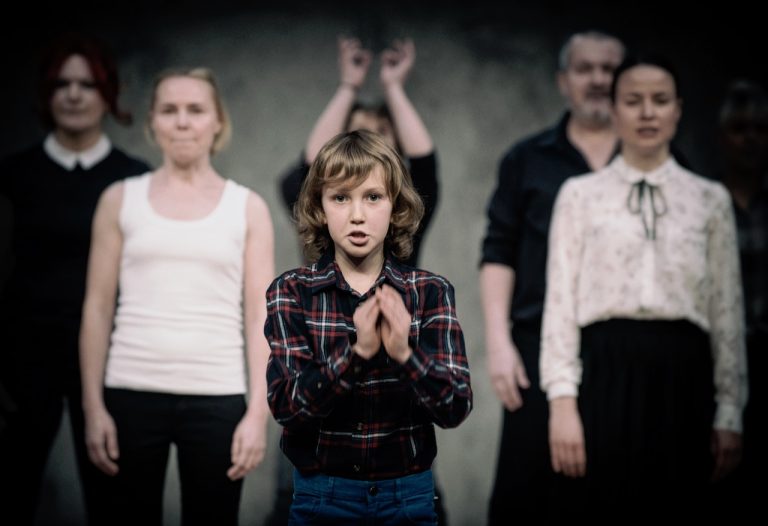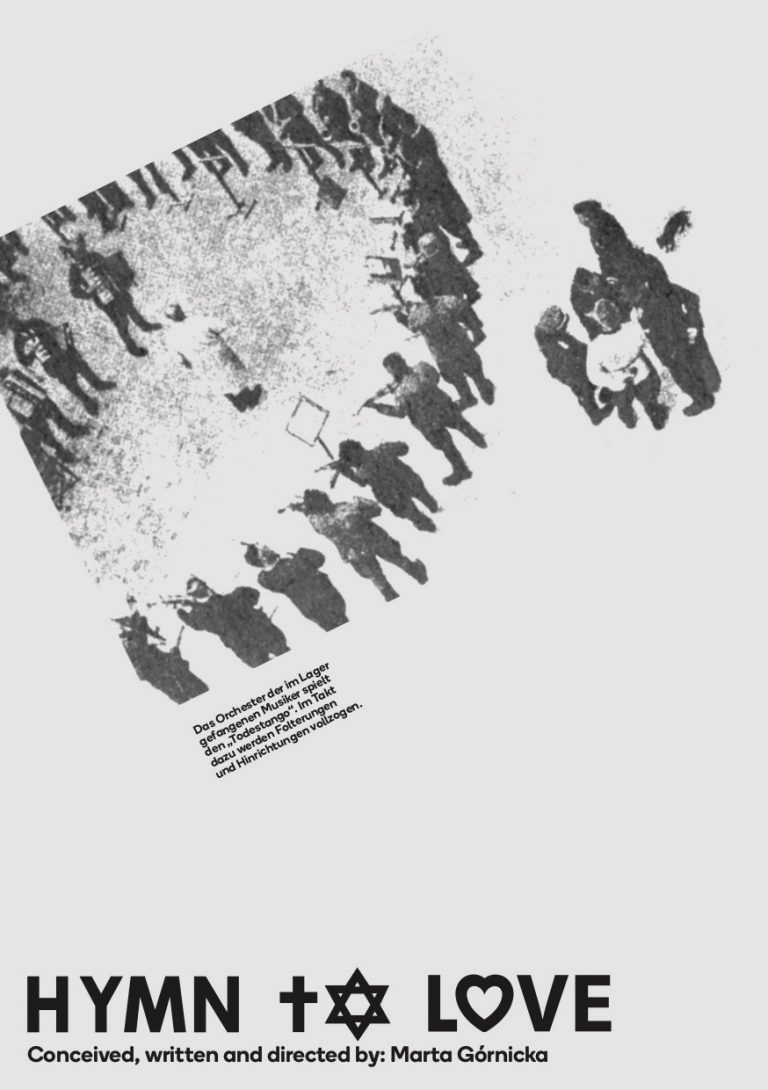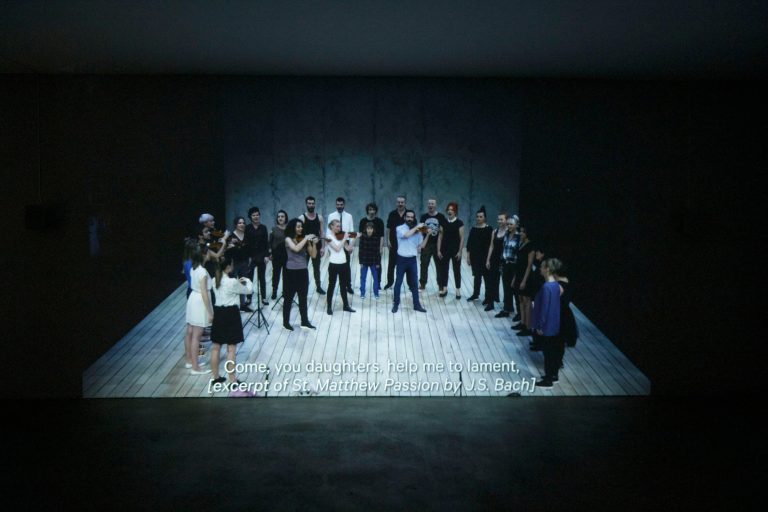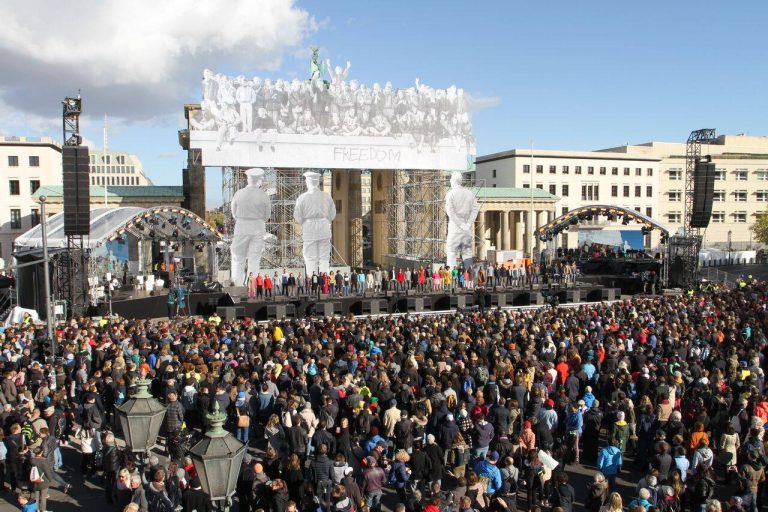12 Sep –
18 Nov 2020
Marta Górnicka
Marta Górnicka
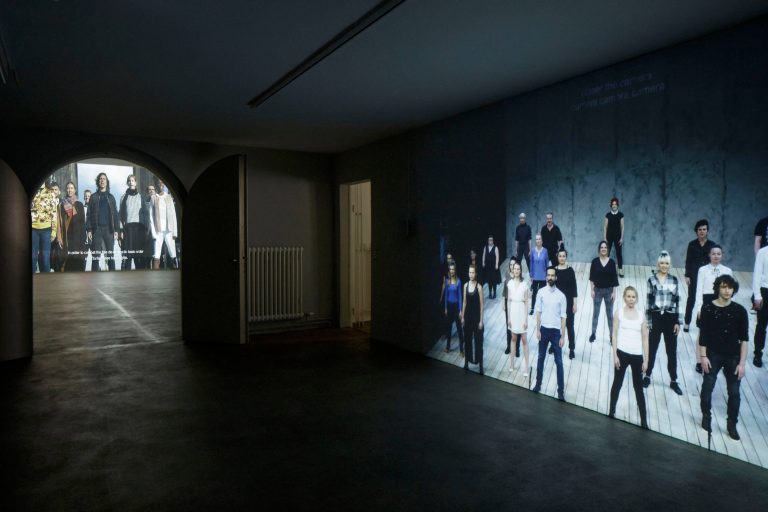
Installation view, Grundgesetz (left), Hymn to Love (right), © Ludger Paffrath, Courtesy Ebensperger
The human voice, and its musical treatment, the working on language through music and voice grounded in the body is, to me, the most powerful tool in the theater. The revolution is in the voice. “Giving away” your voice is dangerous (as in various populisms), but speaking up with your own voice can strengthen and build entities and communities. It is always about finding voice.
Marta Górnicka
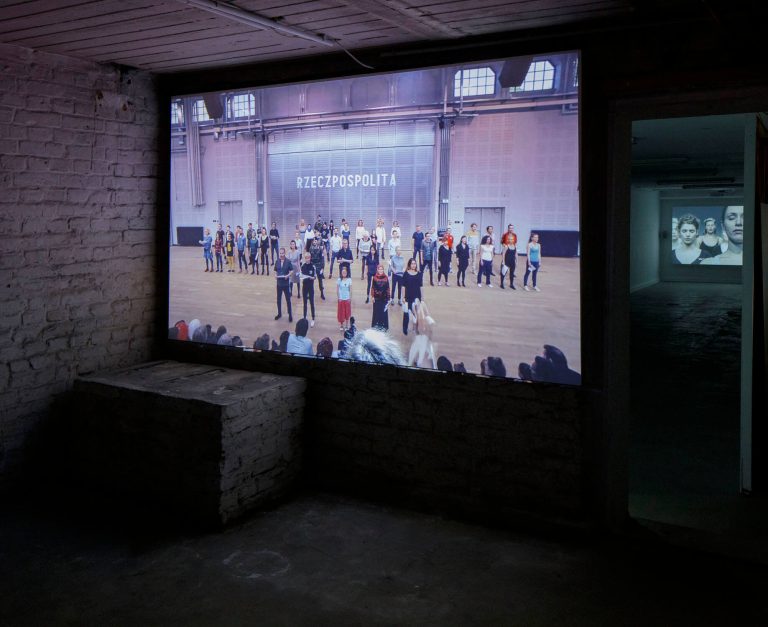
Marta Górnicka, Constitution for a Chorus of Poles, 2016, Video, 27’ (left); Magnificat, 2012, Video, 37’ (right), installation view © Ludger Paffrath, Courtesy Ebensperger
“Multitude” at Ebensperger Berlin, in collaboration with Luxoom Lab, is the first monographic exhibition of works by Marta Górnicka, a stage director and the re-discoverer of the choral principle. The exhibition presents film/sound installations of some of the artist’s most important works: HYMN TO LOVE, GRUNDGESETZ, REQUIEMACHINE, MAGNIFICAT, M(OTHER) COURAGE and CONSTITUTION FOR THE CHORUS OF POLES. Marta Górnicka’s works are well known to the German audiences as the artist has collaborated with German theatres for a number of years. Currently, she is in partnership with the Maxim Gorki Theater in Berlin, where she has established the POLITICAL VOICE INSTITUTE – a socio-theatrical laboratory. In 2016, Górnicka received a nomination for the prestigious Deutscher Theaterpreis Der Faust for her production M(OTHER) COURAGE at the Staatstheater Braunschweig. Górnicka’s works have been shown at many group exhibitions, including the 7th Moscow International Biennale of Contemporary Art 2017-2018, Late Polishness at the Contemporary Art Centre in Warsaw 2017, the Third Berlin Autumn Salon 2017 and the 1st Riga International Biennial of Contemporary Art at the Tallinn Art Hall 2018. Her performance JEDEM DAS SEINE, produced by the Münchner Kammerspiele, opened the Fourth Berlin Autumn Salon in 2019.
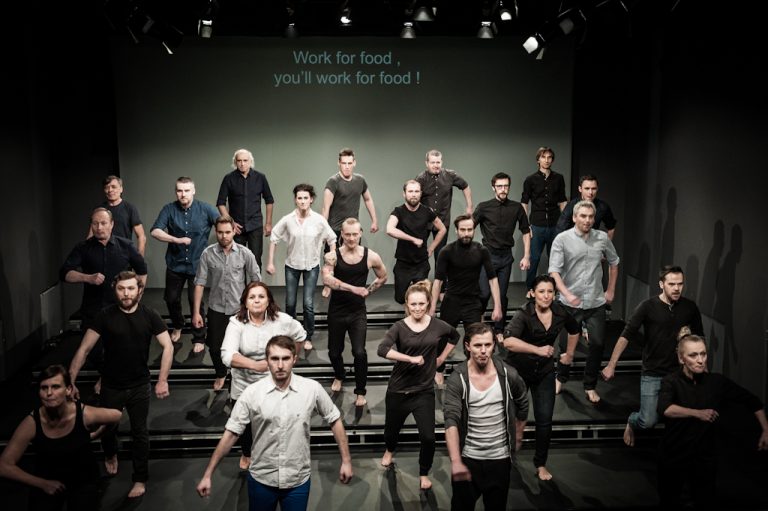
Marta Górnicka, Requiemachine, 2013, Video 42’. Edition of 5 + 2 artist proofs © Marta Ankiersztejn
The title “Multitude” refers to the collective subject with whom Marta Górnicka works. It indicates the radically political dimension of her artistic exploration. THE CHORUS which she brings into existence as the sole protagonist of her performances is always both a critical tool to examine modern mechanisms of control, exclusion and violence, and a vehicle of community.
THE CHORUS contains the irreducible diversity of separate beings, each of whom has full legitimacy to participate in what they have in common: their collective voice and collective breath.
The politicality of Górnicka’s CHORUS always goes in a particular direction. Throughout her career, she has engaged in the tensest conflicts of the societies in which she works. Her first theatre group THE CHORUS OF WOMEN, created in 2010 in Warsaw, Poland, gave voice to women who were experiencing growing oppression from the conservative alliance of each consecutive national government with the Catholic church post-1989. In Košice, Slovakia, Górnicka worked with the stigmatized Romani community. In Israel, she began work on her trilogy inspired by Bertolt Brecht’s “Mother Courage”. There, she created a CHORUS comprised of Jewish and Muslim mothers and children, and Israeli soldiers. The trilogy’s subsequent parts HYMN TO LOVE and M(OTHER) COURAGE – were created in Poland and Germany respectively. The director engaged with the subject of rising nationalism and the horror and seductive beauty of a community built on excluding Others. The trilogy also returned to the communities’ most difficult experience: the Holocaust, and mapped different spaces of the collective unconscious.
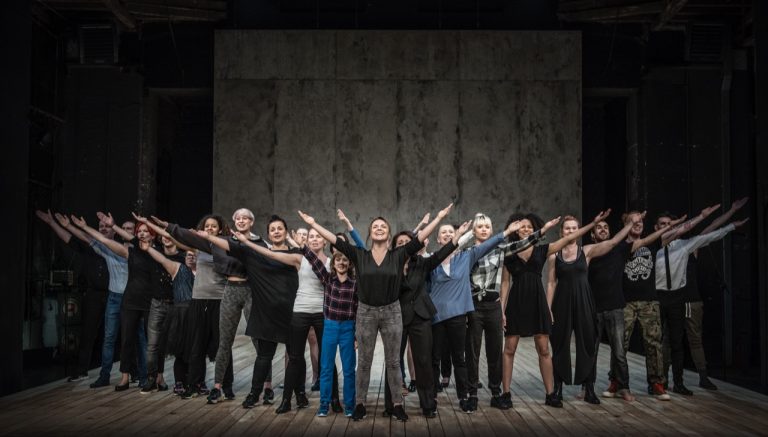
Marta Górnicka, Hymn to Love, 2017. Video45’ Edition of 5 + 2 artist proofs
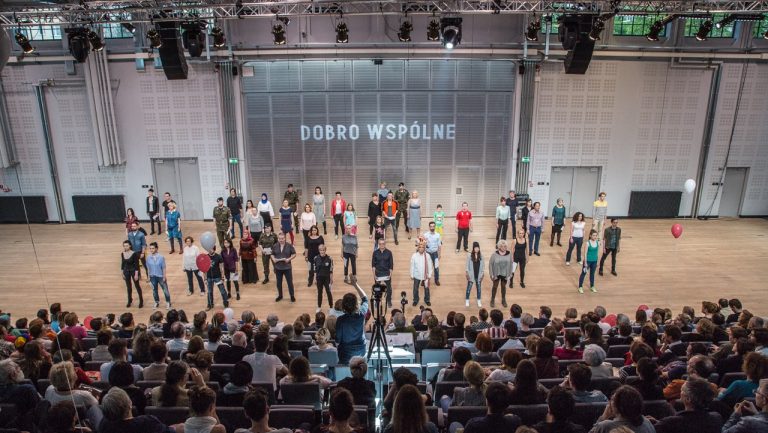
Marta Górnicka, Constitution for the Chorus of Poles, 2016, Video 27’. Edition of 5 + 2 artist proofs © Michał Rumas
When an extreme right government rose to power in Poland and began dismantling democratic institutions, Górnicka summoned a CHORUS OF POLES to read the Polish CONSTITUTION collectively. Representatives of both the right and left side of the suddenly polarized Polish society stood beside Jewish people, Catholics, children, seniors, people with Down syndrome, actors and actresses from Nowy Teatr in Warsaw and THE CHORUS OF WOMEN, refugees unsuccessfully looking for help in Poland, members of the Vietnamese community and members of the paramilitary association „Strzelec”. The multitude was not so much a theatrical image of society as it was society itself, with all of its contradictions, tensions and impassable divisions. By performing the text of the Polish constitution, it spoke many languages in one human voice. In 2018, Marta Górnicka prepared a choral version of the German GRUNDGESETZ. She summoned a postimmigrant CHORUS of fifty Berliners in order to put the German Constitution to a stress test at the foot of the Brandenburg Gate. Diverse bodies and voices, with their individual stories determined by various political forces, met in the public space to ask the fundamental question: whether the GRUNDGESETZ could be a basis for a community whose identity is open to multitudes.
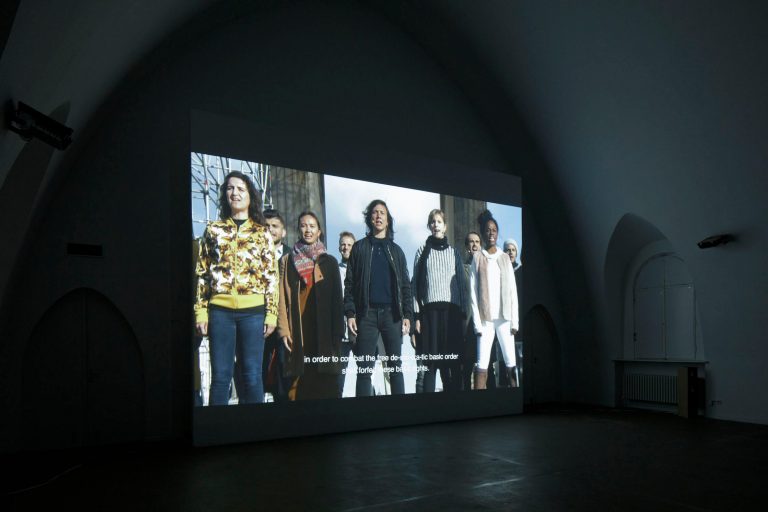
Marta Górnicka Grundgesetz – Ein chorischer Stresstest, 2018, Video, 33’, installation view © Ludger Paffrath, Courtesy Ebensperger/Luxoom Lab
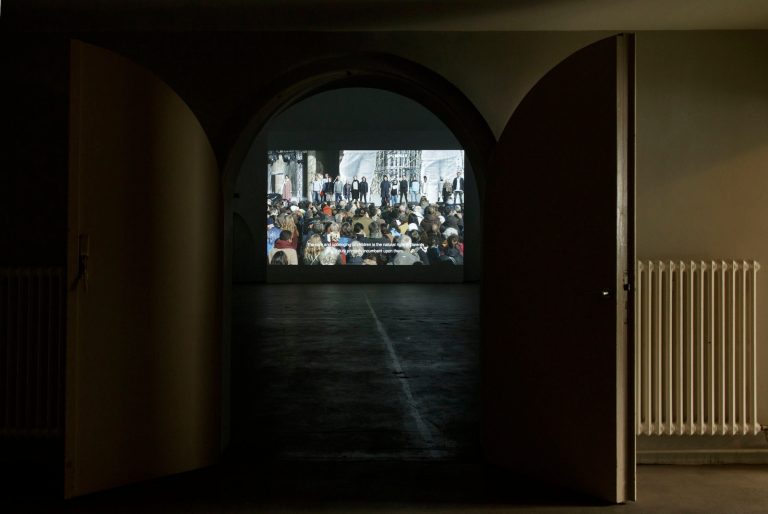
Marta Górnicka Grundgesetz – Ein chorischer Stresstest, 2018, Video, 33’, installation view © Ludger Paffrath, Courtesy Ebensperger/Luxoom Lab
In Marta Górnicka’s works, the collective voice of the CHORUS gains revolutionary power. It is a tool of political engagement, but also a space for what is unconditionally common. The voice exits bodies and enters them – no matter the language, the background, the story, the identity or the religion. And in order to emit voice, one must take a breath – which is shared with others. In its very form, Marta Górnicka’s CHORUS communicates the basic human interdependence and the irreducible plurality of people. Especially today, when the CHORUS cannot take a collective breath, and when thousands cannot listen to it like they did at the Brandenburg Gate, it can be felt with great power.
Marta Górnicka
Grundgesetz – A Choral Stress Testing at the Brandenurger Tor (Trailer)
3 October 2019
Courtesy Maxim Gorki Theater

